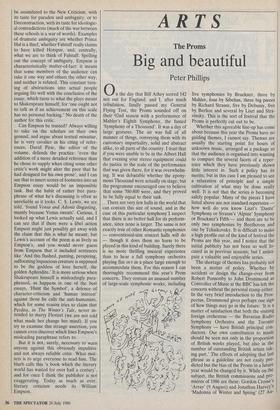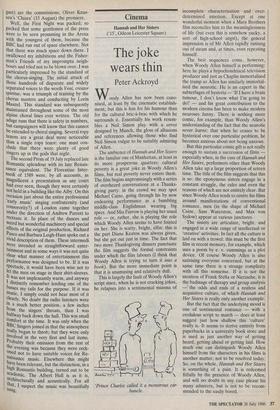ARTS
The Proms
Big and beautiful
Peter Phillips
0 n the day that Bill Athey scored 142 not out for England, and I, after much tribulation, finally passed my General Flying Test, the Proms sounded off on their 92nd season with a performance of Mahler's Eighth Symphony, the famed `Symphony of a Thousand'. It was a day of large gestures. The air was full of all manner of things, conveying them with its customary impartiality, solid and abstract alike, to all parts of the country. I trust that if you were unable to be in the Albert Hall that evening your stereo equipment could do justice to the scale of the performance that was given there, for it was overwhelm- ing. It was debatable whether the epony- mous Thousand were actually on stage; but the programme encouraged one to believe that some 700-800 were, and they proved to be fully equal to their task.
There are very few halls in the world that can contain this size of sound, and in the case of this particular symphony I suspect that there is no better hall for its perform- ance, since none is larger. The same is not exactly true of other Romantic symphonies — conventional-size concert halls will do — though it does them no harm to be played in this kind of building. Surely there is no more thrilling musical experience than to hear a full symphony orchestra playing flat out in a place large enough to accommodate them. For this reason I can thoroughly recommend this year's Prom concerts. They contain an unusual number of large-scale symphonic works, including five symphonies by Bruckner, three by Mahler, four by Sibelius, three big pieces by Richard Strauss, five by Debussy, five by Berlioz and several by Liszt and Stra- vinsky. This is the sort of festival that the Proms is perfectly cut out to be.
Whether this agreeable line-up has come about because this year the Proms have no guiding themes, I cannot say. Themes are usually the starting point for hours of unknown music, arranged as a package so that the audience is organised into wanting to compare the several facets of a reper- toire which they have previously shown little interest in. Such a policy has its merits; but in this case I am pleased to see a relaxation of principle and a simple cultivation of what may be done really well. It is not that the series is becoming safely popular. Many of the pieces I have listed above are not standard repertoire how well do you know Liszt's `Dante' Symphony or Strauss's `Alpine' Symphony or Bruckner's Fifth — and there are to be only two symphonies by Beethoven and one by Tchaikovsky. It is difficult to make a high profile out of the kind of festival the Proms are this year, and I notice that the initial publicity has not been so well fo- cused as in previous seasons; but I antici- pate a valuable and enjoyable series.
The shortage of themes has probably not been a matter of policy. Whether by accident or design the change-over from Robert Ponsonby to John Drummond as Controller of Music at the BBC has left the concerts without the personal stamp either. In the very brief introduction to the Pros- pectus, Drummond gives perhaps one sign of how things may go in the future: 'It is a matter of satisfaction that both the visiting foreign orchestras — the Bavarian Radio Symphony Orchestra and the Toronto Symphony — have British principal con- ductors. Our own contribution to music should be seen not only in the proportion of British works played, but also in the number of outstanding British artists tak- ing part.' The effects of adopting that last phrase as a guideline are not easily pre- dicted but the bias of the Proms in a future year would be changed by it. While on the subject, the British commissions and pre- mieres of 1986 are these: Gordon Crosses 'Array' (9 August) and Jonathan Harvey's `Madonna of Winter and Spring' (27 Au- gust) are the commissions; Oliver Knus- sen's `Chiara' (15 August) the premiere.
Well, the First Night was packed; so packed that some gentlemen of the press were to be seen promming in the Arena with the youngest of them, because the BBC had run out of space elsewhere. Not that there was much space down -there. I swalldwed my inhibitions and the Fisher- man's Friends of my impromptu neigh- bours and tried not to be blown over. I was particularly impressed by the standard of the chorus-singing. The initial attack of those hundreds of disparate and widely separated voices to the words Veni, creator spiritus, was a triumph of training by the chorus masters and conducting by Lorin Maazel. This standard was subsequently maintained throughout some of the most alpine choral lines ever written. The old adage runs that there is safety in numbers, but campaigners will know that this cannot be extended to choral singing. Several ropy tenors are a great deal more noticeable than a single ropy tenor: one must con- clude that there were plenty of good singers up in the gods that night.
The second Prom of 19 July replaced late Romantic splendour with its late Renais- sance equivalent. The Florentine Inter- medi of 1589 were, by all accounts, as magnificent a presentation as any court had ever seen, though they were certainly not held in a building like the Alby. On this occasion just about the entire professional early music' singing confraternity (and consorority?) of London came together under the direction of Andrew Parrott to recreate it. In place of the dances and weird but wonderful machinery and special effects of the original production, Richard Pasco and Barbara Leigh-Hunt spoke out a vivid description of them. These intermedi were intended as straightforward enter- tainment and in some ways it was not quite clear what manner of entertainment this Performance was designed to be. If it was spectacle, it would have been wise not to let the men on stage in their shirt-sleeves. It was not unpleasantly warm, and anyway I distinctly remember lending one of the basses my my tails for the purpose. If it was music, I simply could not hear most of it clearly. No doubt the radio listeners were in a much better position, a few inches from the singers' throats, than I was halfway back down the hall. This was small comfort at the time. It was only when the 1113C Singers joined in that the atmosphere really began to throb; but they were only involved in the very first and last items. Probably their omission from the rest of the evening was because they were reck- oned not to have suitable voices for Re- naissance music. Elsewhere this might have been relevant, but the distinction, in a high Romantic building, turned out to be academic. The Albert Hall is as it is, architecturally and acoustically. For all 'hat, I suspect the music was beautifully sung.



















































 Previous page
Previous page